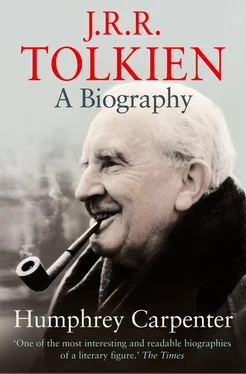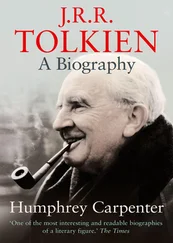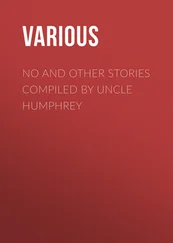I am still nervous that there will be other and harder questions, doubly nervous because I cannot hear everything that he is saying. He has a strange voice, deep but without resonance, entirely English but with some quality in it that I cannot define, as if he had come from another age or civilisation. Yet for much of the time he does not speak clearly. Words come out in eager rushes. Whole phrases are elided or compressed in the haste of emphasis. Often his hand comes up and grasps his mouth, which makes it even harder to hear him. He speaks in complex sentences, scarcely hesitating – but then there comes a long pause in which I am surely expected to reply. Reply to what? If there was a question, I did not understand it. Suddenly he resumes (never having finished his sentence) and now he reaches an emphatic conclusion. As he does so, he jams his pipe between his teeth, speaks on through clenched jaws, and strikes a match just as the full stop is reached.
Again I struggle to think of an intelligent remark, and again he resumes before I can find one. Following some slender connecting thread, he begins to talk about a remark in a newspaper that has made him angry. Now I feel that I can contribute a little, and I say something that I hope sounds intelligent. He listens with courteous interest, and answers me at some length, turning my remark (which was really very trivial) to excellent use, and so making me feel that I have said something worth saying. Then he is off on some tangential topic, and I am once more out of my depth, able to contribute no more than a monosyllable of agreement here and there; though it does occur to me that I am perhaps valued just as much as a listener as a participant in the conversation.
As he talks he moves unceasingly, pacing about the dark little room with an energy that hints at restlessness. He waves his pipe in the air, knocks it out in an ashtray, fills it, strikes a match, but scarcely ever smokes for more than a few puffs. He has small, neat, wrinkled hands, with a plain wedding-ring on the third finger of the left hand. His clothes are a little rumpled, but they sit well on him, and though he is in his seventy-sixth year there is only a suggestion of tubbiness behind the buttons of his coloured waistcoat. I cannot for long keep my attention from his eyes, which may wander about the room or stare out of the window, yet now and then will return to dart a glance at me or rest a steady gaze as some vital point is made. They are surrounded by wrinkles and folds that change with and emphasise each mood.
The flood of words has dried up for a moment and the pipe is being lit again. I perceive my opportunity, and state my business, which now seems unimportant. Yet he turns to it immediately with enthusiasm, and listens to me attentively. Then, when this part of the conversation is done, I get up to go; but for the moment my departure is evidently neither expected nor desired, for he has started to talk again. Once more he refers to his own mythology. His eyes fix on some distant object, and he seems to have forgotten that I am there as he clutches his pipe and speaks through its stem. It occurs to me that in all externals he resembles the archetypal Oxford don, at times even the stage caricature of a don. But that is exactly what he is not. It is rather as if some strange spirit had taken on the guise of an elderly professor. The body may be pacing this shabby little suburban room, but the mind is far away, roaming the plains and mountains of Middle-earth.
Then it is all over, and I am being ushered out of the garage and taken to the garden gate – the smaller one opposite the front door: he explains that he has to keep the garage gates padlocked to stop football spectators parking their cars in his drive when they attend matches at the local stadium. Rather to my surprise, he asks me to come and see him again. Not for the moment, as neither he nor Mrs Tolkien has been well, and they are going on holiday to Bournemouth, and his work is many years behind-hand, and letters are piling up unanswered. But some time, soon. He shakes my hand and is gone, a little forlornly, back into the house.
PART TWO 1892–1916: Early years
On a March day in 1891 the steamer Roslin Castle left dock to sail from England to the Cape. Standing on the stern deck, waving to the family she would not see again for a long time, was a slim good-looking girl of twenty-one. Mabel Suffield was going to South Africa to marry Arthur Tolkien.
It was in every way a dividing point in her life. Behind her lay Birmingham, foggy days, and family teas. Ahead was an unknown country, eternal sunshine, and marriage to a man thirteen years her senior.
Although Mabel was so young, there had been a long engagement, for Arthur Tolkien had proposed to her and she had accepted three years earlier, soon after her eighteenth birthday. However, her father would not permit a formal betrothal for two years because of her youth, and so she and Arthur could only exchange letters in secret and meet at evening parties where the family eye was upon them. The letters were entrusted by Mabel to her younger sister Jane, who would pass them to Arthur on the platform of New Street Station in Birmingham, when she was catching a train home from school to the suburb where the Suffields lived. The evening parties were generally musical gatherings at which Arthur and Mabel could only exchange covert glances or at most the touch of a sleeve, while his sisters played the piano.
It was a Tolkien piano, of course, one of the upright models manufactured by the family firm that had made what money the Tolkiens once possessed. On the lid was inscribed: ‘Irresistible Piano-Forte: Manufactured Expressly for Extreme Climates’; but the piano firm was in other hands now, and Arthur’s father was bankrupt, without a family business to provide employment for his sons. Arthur had tried to make a career in Lloyds Bank, but promotion in the Birmingham office was slow, and he knew that if he was to support a wife and family he would have to look elsewhere. He turned his eye to South Africa, where the gold and diamond discoveries were making banking into an expanding business with good prospects for employees. Less than a year after proposing to Mabel he had obtained a post with the Bank of Africa, and had sailed for the Cape.
Arthur’s initiative had soon been justified. For the first year he had been obliged to travel extensively, for he was sent on temporary postings to many of the principal towns between the Cape and Johannesburg. He acquitted himself well, and at the end of 1890 he was appointed manager of the important branch at Bloemfontein, capital of the Orange Free State. A house was provided for him, the income was adequate, and so at last marriage was possible. Mabel celebrated her twenty-first birthday at the end of January 1891, and only a few weeks later she was on board Roslin Castle and sailing towards South Africa and Arthur, their betrothal now blessed with her father’s approval.
Or perhaps ‘tolerance’ would be a better word, for John Suffield was a proud man, especially in the matter of ancestry which in many ways was all he had left to be proud of. Once he had owned a prosperous drapery business in Birmingham, but now like Arthur Tolkien’s father he was bankrupt. He had to earn his living as a commercial traveller for Jeyes disinfectant; yet the failure of his fortunes had only strengthened his pride in the old and respectable Midland family from which he was descended. What were the Tolkiens in comparison? Mere German immigrants, English by only a few generations – scarcely a fit pedigree for his daughter’s husband.
If such reflections occupied Mabel during her three-week voyage, they were far from her mind on the day early in April when the ship sailed into harbour at Cape Town, and she caught sight at last of a white-suited, handsome, and luxuriantly-moustached figure on the quay, scarcely looking his thirty-four years as he peered anxiously through the crowd for a glimpse of his darling ‘Mab’.
Читать дальше












